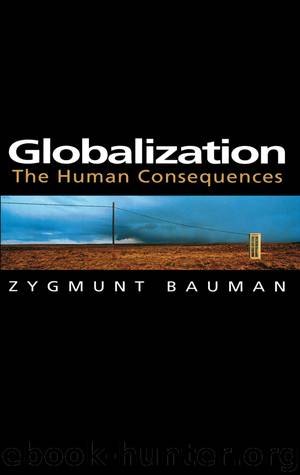Globalization by Bauman Zygmunt;

Author:Bauman, Zygmunt;
Language: eng
Format: epub
Publisher: Wiley
The global hierarchy of mobility
Let us recall once more what Michel Crozier pointed out many years ago in his trail-blazing study of The Bureaucratic Phenomenon: all dominance consists in the pursuit of an essentially similar strategy – to leave as much leeway and freedom of manoeuvre to the dominant, while imposing the strictest possible constraints on the decisional freedom of the dominated side.
This strategy was once successfully applied by state governments, which now, however, find themselves on its receiving end. It is now the conduct of the ‘markets’ – primarily, world finances – which is the main source of surprise and uncertainty. It is not difficult to see therefore that the replacement of territorial ‘weak states’ by some sort of global legislative and policing powers would be detrimental to the interests of ‘world markets’. And so it is easy to suspect that, far from acting at cross-purposes and being at war with each other, political fragmentation and economic globalization are close allies and fellow conspirators.
Integration and parcelling out, globalization and territorialization, are mutually complementary processes. More precisely, they are two sides of the same process: that of the world-wide redistribution of sovereignty, power and the freedom to act, triggered (though by no means determined) by the radical leap in the technology of speed. The coincidence and intertwining of synthesis and dissipation, integration and decomposition are anything but accidental; even less are they rectifiable.
It is because of this coincidence and intertwining of the two apparently opposite tendencies, both set in motion by the divisive impact of the new freedom of movement, that the so-called ‘globalizing’ processes rebound in the redistribution of privileges and deprivations, of wealth and poverty, of resources and impotence, of power and powerlessness, of freedom and constraint. We witness today the process of a world-wide restratification, in the course of which a new socio-cultural hierarchy, a world-wide scale, is put together.
The quasi-sovereignties, territorial divisions and segregations of identities which the globalization of markets and information promotes and renders ‘a must’, do not reflect diversity of equal partners. What is a free choice for some descends as cruel fate upon others. And since those ‘others’ tend to grow unstoppably in numbers and sink ever deeper into despair born of a prospectless existence, one will be well advised to speak of ‘glocalization’ (Roland Robertson’s apt term, exposing the unbreakable unity between ‘globalizing’ and ‘localizing’ pressures – a phenomenon glossed over in the one-sided concept of globalization), and to define it mostly as the process of the concentration of capital, finance and all other resources of choice and effective action, but also – perhaps above all – of the concentration of freedom to move and to act (two freedoms which for all practical purposes have become synonymous).
Commenting on the findings of the UN’s latest Human Development Report, that the total wealth of the top 358 ‘global billionaires’ equals the combined incomes of 2.3 billion poorest people (45 per cent of the world’s population), Victor Keegan14 called the present reshuffling of the world resources ‘a new form of highway robbery’.
Download
This site does not store any files on its server. We only index and link to content provided by other sites. Please contact the content providers to delete copyright contents if any and email us, we'll remove relevant links or contents immediately.
The Secret History by Donna Tartt(18157)
The Social Justice Warrior Handbook by Lisa De Pasquale(11951)
Thirteen Reasons Why by Jay Asher(8451)
This Is How You Lose Her by Junot Diaz(6435)
Weapons of Math Destruction by Cathy O'Neil(5829)
Zero to One by Peter Thiel(5488)
Beartown by Fredrik Backman(5351)
The Myth of the Strong Leader by Archie Brown(5237)
The Fire Next Time by James Baldwin(5016)
How Democracies Die by Steven Levitsky & Daniel Ziblatt(4952)
Promise Me, Dad by Joe Biden(4908)
Stone's Rules by Roger Stone(4857)
100 Deadly Skills by Clint Emerson(4689)
A Higher Loyalty: Truth, Lies, and Leadership by James Comey(4550)
Rise and Kill First by Ronen Bergman(4545)
Secrecy World by Jake Bernstein(4388)
The David Icke Guide to the Global Conspiracy (and how to end it) by David Icke(4379)
The Farm by Tom Rob Smith(4323)
The Doomsday Machine by Daniel Ellsberg(4245)
